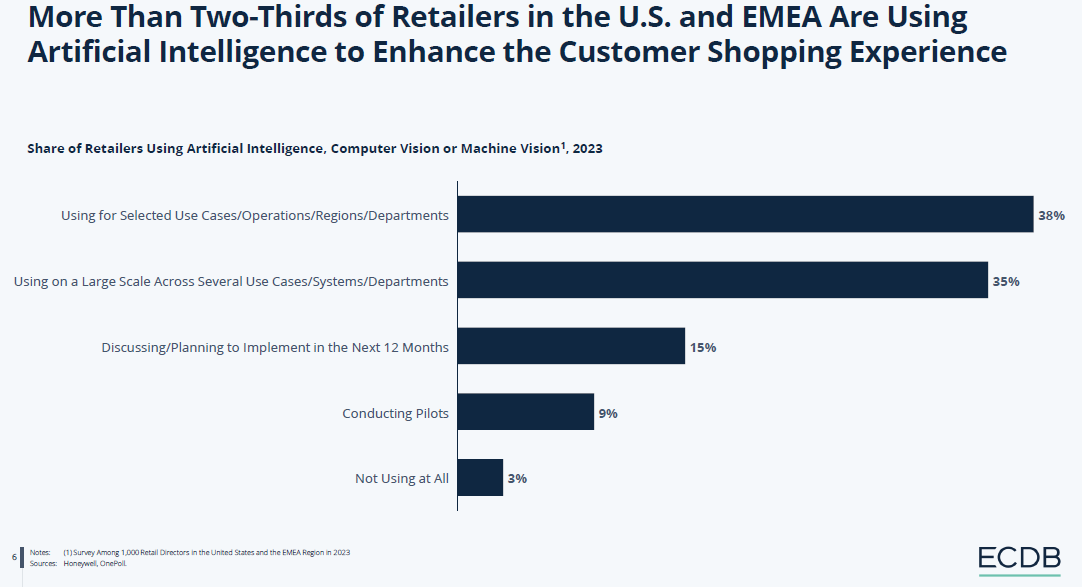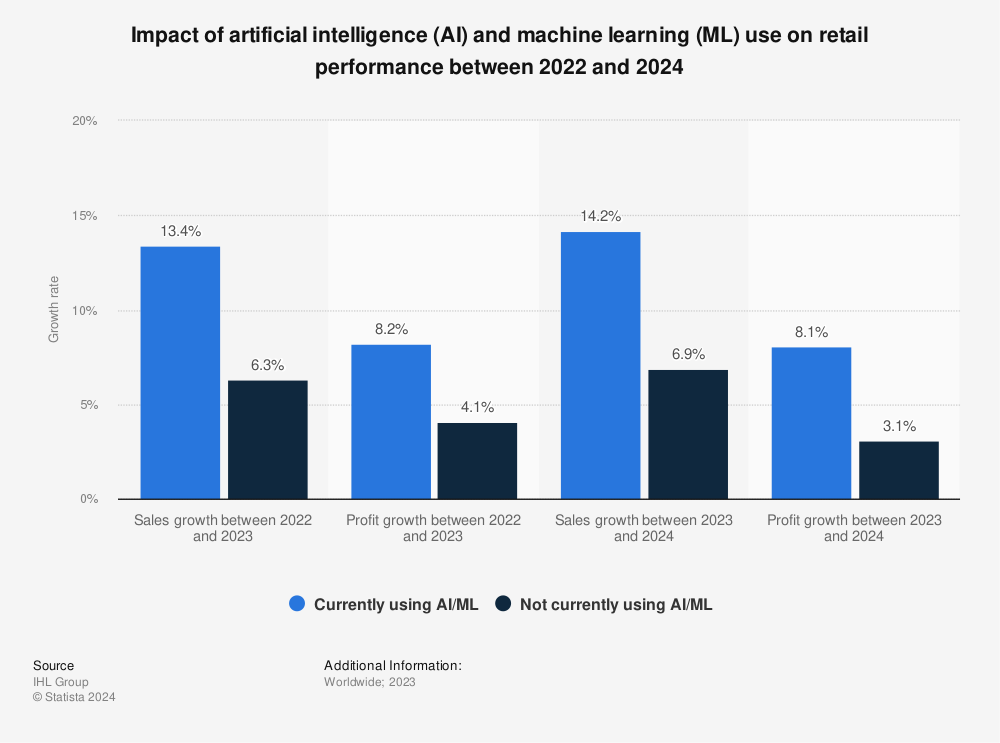Introduction
The retail scenario in the US has evolved into a mix of offline stores and eCommerce sites facilitating online sales. The share of eCommerce in total retail shares is currently at around 16% and is expected to reach 20% by 2027.

According to a survey in the US, 93% of consumers rely on online reviews while making purchasing decisions. This signifies the importance of data and the ability to extract insights from it.
The competition in the retail and eCommerce space has become intense. Customers look for values like convenience, personalization, service quality, and a lot of other factors along with pricing and product quality. As of 2023, more than two-third of retailers in the US and EMEA were using AI to enhance their retail and eCommerce operations.

A major application of AI is to derive customer insights. Traditionally, analyzing customer data was slow and limited. AI gathers data from various sources (websites, social media) and extracts insights, revealing customer trends.
Features like NLP, data analytics, and augmented reality can be leveraged for decision-making, sentiment analysis, and customer experience and improve the overall business capabilities.
How AI is Transforming Customer Insights
-
Personalization:
- AI can be implemented in eCommerce platforms to collect data on a large number of customers’ buying preferences, search patterns, shopping experiences, and purchasing decisions.
- Analysis of such data provides insights for providing personalized product recommendations, analyzing customer loyalty, and recommending rewards in the form of discount offers, cashback, etc.
-
Sentiment analysis:
- AI models can be designed to crawl through social media, product reviews, and other eCommerce platforms and collect both quantitative and qualitative data
- It could be about products and services, pricing, consumer preferences, and pain points in the form of comments or reviews.
- This can provide insights on how a segment of the consumer base is reacts to a particular product in the market.
- This allows the retailers to make necessary improvements in their product’s pricing, and add popular products to their portfolio.
-
Website and app behavior tracking:
- AI can analyze user journeys in an eCommerce platform and uncover pain points. For e.g. where do users face difficulties to navigate and recommend improvement measures?
- It can also analyze search texts correlate with other users’ search patterns and return precise results making the platform more accessible and user-friendly.
-
Inventory Management:
- AI can be used to analyze past sales data and demand patterns for products, forecast future demands, and restock inventory to avoid stock-out losses.
- Precise prediction of demand, reordering point, and ordering quantity can reduce carrying and ordering costs.
-
Designing Sale-Events:
- Another use case of AI is in designing large sale events similar to Amazon’s “Black Friday” sales, wherein products are offered at discounted rates.
- Analyzing past data and customers’ buying patterns on such occasions can provide insights into which products are most sold or what price strategies can generate the highest revenue.
Challenges and Considerations
AI can enhance the performance of retail/e-commerce organizations by allowing them to leverage the power of data and get a competitive advantage. However, AI needs data in order to add value in the organization. Sometimes the requirement of data is beyond what is available publicly. The challenges in implementing AI are;
- Some activities require retailers to store data like customer PII, their purchase history, offers and discounts, etc. which increases privacy concerns and requirement of compliance measures to regulation.
- Developing the AI models as well as managing the data requires skilled personnel. It could be a challenge for small and medium-scale retail businesses to hire such personnel.
- The cost of infrastructure for leveraging AI can also be relatively higher for such businesses.
- The core operation of retail businesses is buying and selling goods. Implementation of AI can take up a significant amount of time and resources which could have been invested in the core operations.
Retail and eCommerce businesses can consider partnering with tech companies to facilitate the implementation of AI/ML in their business model. This can benefit the retail business as follows:
- Tech companies have the expertise and resources to manage AI projects.
- They can address challenges like infrastructure, data security, compliance, and human resources
- This can free up the time and resources for retailers to invest in the core business operation with insights from AI.
The Future of AI in Retail

Implementing AI has a huge impact on the growth of the retail business. A report published on Statista shows that businesses that implemented AI/ML showed 14.2% growth in sales and 8.1 % growth in profit whereas businesses operating without AI/ML grew by 6.9% in sales and 3.1% in profit in the period 2023-24. This signifies the role of AI in increasing sales and reducing cost.
The size of the global AI market in the retail industry which is at 10.76% currently is estimated to grow to 31.18% in 2028. This indicates that the competition in the retail landscape will be driven by AI/ML.
Conclusion
The US retail landscape is undergoing a transformation, with online shopping booming alongside traditional brick-and-mortar stores. E-commerce currently holds a 16% share of the market and is projected to reach 20% by 2027. Customer reviews, a major factor in purchasing decisions (93% of consumers rely on them), emphasize the importance of data insights. Traditionally, analyzing this data was a slow and limited process.
Here’s where AI steps in, revolutionizing customer insights. AI gathers data from various sources like websites and social media, revealing valuable customer trends. Personalization, sentiment analysis, website optimization, and even inventory management are all enhanced with AI. This translates to a more user-friendly shopping experience, improved product recommendations, and efficient inventory management.
However, challenges remain. Data privacy concerns exist, and skilled personnel for AI implementation can be scarce. Fortunately, partnering with tech companies can help retailers navigate these hurdles, allowing them to focus on core operations while leveraging AI solutions. Studies show businesses using AI experience significant growth compared to those without. The global AI market in retail is expected to triple by 2028, reflecting its growing importance. As eCommerce continues to rise in the US (reaching an estimated 20.6% share), AI is poised to be a major driver of success in the competitive retail landscape.
Elevate your online business with Mindfire Solutions’ expert eCommerce development services. Transform your vision into a seamless, high-performing digital storefront that drives sales and enhances customer experience.
